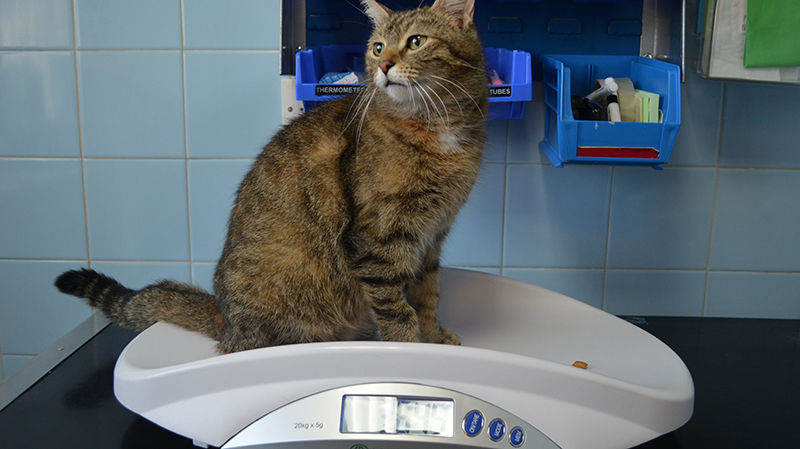Why do vets need accurate weighing scales?

A pet’s weight can be the first and sometimes the only indicator of health problems - and vets need accurate weighing scales to precisely analyse whether a pet is a healthy weight.
Problems can arise if the pet becomes too heavy, or weighs too little due to insufficient nutrients.
Our pet weight guide looked at helpful tips for controlling your pet’s weight, but it is important that the reading you are looking at is accurate. Read on to find out why.
Why track your pet’s weight?
As is the case with humans, obese animals can encounter breathing problems, as their lungs are forced to work harder to move their weight.
Hepatic lipidosis is a liver disease most common in cats - it is associated with obesity and can be life threatening.
Obesity can also lead to intervertebral disc disease (IVDD) which can result in compression of the spine and can leave dogs paralysed if they are not treated quickly.
You can find out more about the health consequences of obesity in pets by clicking here.
Why do you need accurate scales?
Vets may be able to tell a lot about a pet’s condition through visual clues such as irritated skin and unkempt fur - but by analysing the pet’s exact weight they can easily assess and implement changes to the pet’s diet.
Body weight trends can also be a warning sign of health problems - which is why it is important to both a) weigh accurately and b) keep a record of changes in weight.
Not to mention, animals can feel a little distressed when they are in a veterinary surgery. Pets are unlikely to stay still, so using the Hold function is imperative to maintain the pet’s weight on the display. The animal weighing function is also crucial to an accurate weight.
Shula Berg from Springfield Veterinary Group, Rotherham told Marsden: “Essentially vets need accurate scales to ensure patient safety. We calculate all of our drug dosages on a patient’s individual weight, so if the scales used are inaccurate we risk under- or over-dosing the patient.
“This could be irrelevant if the error is small, however some drugs have a narrow safety margin, especially in small patients, and inaccurate scales risk us giving an ineffective or even dangerously high dose. This also impacts on issues such as antibiotic resistance, as we need to ensure sufficient quantities of antibiotic are given to effectively clear an infection.”
“We use scales to monitor patient bodyweight to prevent/treat obesity. Inaccurate scales that overestimate weight are demoralising, especially if a client is trying very hard to be strict with their pet, and can lead to people “giving up” the fight.
“Inaccurate scales that underestimate weight would suggest progress that doesn’t match the clinical picture which, ultimately, risks patient health again as it would encourage maintenance of an overweight status. The same principles apply to scales which are used to weigh out a food ration; if the scales cannot be trusted the exercise is pointless.”
For weighing larger pets: The Marsden V-150 and Marsden V-250 are ideal for weighing larger pets. The V-150 has a 300kg capacity and graduations to 50g, a large stainless steel base and non-slip mat. The V-250 is also stainless steel so is easy to keep hygienic and at 50mm high it is easy for animals to access the scales.
For weighing smaller pets: The Marsden V-20 and Marsden V-22 are ideal for weighing smaller pets with a 20kg capacity. The V-20 is lightweight and portable and also doubles up as a stretcher for carrying your pets. The V-22 is highly accurate, with graduations to 5g.
For pets weighing up to 25kg, the Marsden V-25 is accurate to 10g. The V-25 has a bright LCD display and memory recall function.
For more information on any of our options call 01709 364296 or contact us here.